Judethaddeusmoseti
On this page, you find all documents, package deals, and flashcards offered by seller judethaddeusmoseti.
- 39
- 0
- 2
Community
- Followers
- Following
41 items
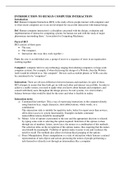
HCI Introduction and Paradigms
This bundle file contains two essays that will guide and equip you with knowledge on Human Computer Interaction and the Paradigms that are involved in HCI. Thanks for your purchase.
- Package deal
- • 2 items •
This bundle file contains two essays that will guide and equip you with knowledge on Human Computer Interaction and the Paradigms that are involved in HCI. Thanks for your purchase.
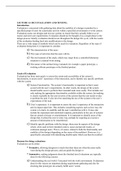
HCI EVALUATION AND TESTING
Evaluation is concerned with gathering data about the usability of a design or product by a specified group of users for a particular activity within a specified environment or work context. Evaluation assess our designs and test our systems to ensure that they actually behave as we expect and meet user requirements. Evaluation should not be thought of as a single phase in the design process. Ideally, evaluation should occur throughout the design life cycle, with the results of the evaluati...
- Summary
- • 8 pages •
Evaluation is concerned with gathering data about the usability of a design or product by a specified group of users for a particular activity within a specified environment or work context. Evaluation assess our designs and test our systems to ensure that they actually behave as we expect and meet user requirements. Evaluation should not be thought of as a single phase in the design process. Ideally, evaluation should occur throughout the design life cycle, with the results of the evaluati...
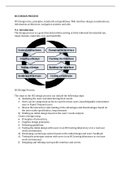
HCI DESIGN PROCESS
The steps in the HCI design process can include the following steps: a) Analyzing the users and determining their needs. • Users can be categorized as Novice and first time users, knowledgeable intermittent uses or Expert frequent users. • Choose the interaction style looking at the advantages and disadvantages based on the users tasks specification /requirements b) Drafting an initial design based on the users' needs analysis. Create a design using: • Principles of interaction,...
- Essay
- • 8 pages •
The steps in the HCI design process can include the following steps: a) Analyzing the users and determining their needs. • Users can be categorized as Novice and first time users, knowledgeable intermittent uses or Expert frequent users. • Choose the interaction style looking at the advantages and disadvantages based on the users tasks specification /requirements b) Drafting an initial design based on the users' needs analysis. Create a design using: • Principles of interaction,...
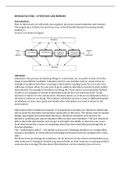
HUMAN FACTORS - ATTENTION AND MEMORY
Attention Attention is the process of selecting things to concentrate on, at a point in time, from the range of possibilities available. Attention involves our auditory and/or visual senses an example of auditory attention is waiting in the dentist’s waiting room for our name to be called out to know when it is our time to go in. auditory attention is based on pitch, timber and intensity. An example of attention involving the visual senses in scanning the football results in a newspaper to a...
- Essay
- • 6 pages •
Attention Attention is the process of selecting things to concentrate on, at a point in time, from the range of possibilities available. Attention involves our auditory and/or visual senses an example of auditory attention is waiting in the dentist’s waiting room for our name to be called out to know when it is our time to go in. auditory attention is based on pitch, timber and intensity. An example of attention involving the visual senses in scanning the football results in a newspaper to a...
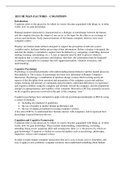
HCI HUMAN FACTORS – COGNITION
COGNITION Cognition refers to the processes by which we (users) become acquainted with things or, in other words, how we gain knowledge Human/computer interaction is characterized as a dialogue or interchange between the human and the computer because the output of one serves as the input for the other in an exchange of actions and intentions. Early characterizations of the human-computer interface were more computer-centric. Displays are human-made artifacts designed to support the pe...
- Essay
- • 6 pages •
COGNITION Cognition refers to the processes by which we (users) become acquainted with things or, in other words, how we gain knowledge Human/computer interaction is characterized as a dialogue or interchange between the human and the computer because the output of one serves as the input for the other in an exchange of actions and intentions. Early characterizations of the human-computer interface were more computer-centric. Displays are human-made artifacts designed to support the pe...
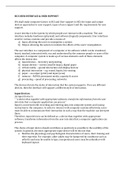
HCI USER INTERFACE & USER SUPPORT
A user interface is the system by which people user interact with a machine. The user interface includes hardware (physical) and software (logical) components. User interfaces exist for various systems and provide a means of: a) Input, allowing the users to manipulate a system b) Output, allowing the system to indicate the effects of the users' manipulation
- Essay
- • 12 pages •
A user interface is the system by which people user interact with a machine. The user interface includes hardware (physical) and software (logical) components. User interfaces exist for various systems and provide a means of: a) Input, allowing the users to manipulate a system b) Output, allowing the system to indicate the effects of the users' manipulation
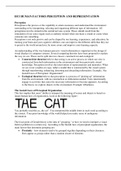
HCI HUMAN FACTORS PERCEPTION AND REPRESENTATION
Perception Perception is the process or the capability to attain awareness and understand the environment surrounding us by interpreting, selecting and organizing different type of information. All perceptions involve stimuli in the central nervous system. These stimuli result from the stimulation of our sense organs such as auditory stimuli when one hears a sound or a taste when someone eats something. Perception is not only passive and can be shaped by our learning, experiences, and educati...
- Essay
- • 3 pages •
Perception Perception is the process or the capability to attain awareness and understand the environment surrounding us by interpreting, selecting and organizing different type of information. All perceptions involve stimuli in the central nervous system. These stimuli result from the stimulation of our sense organs such as auditory stimuli when one hears a sound or a taste when someone eats something. Perception is not only passive and can be shaped by our learning, experiences, and educati...

INTRODUCTION TO HUMAN COMPUTER INTERACTION
Introduction Def. Human Computer Interaction (HCI) is the study of how people interact with computers and to what extent computers are or are not developed for successful interaction with human beings. Def. Human-computer interaction is a discipline concerned with the design, evaluation and implementation of interactive computing systems for human use and with the study of major phenomena surrounding them." Association for Computing Machinery Parts of HCI HCI consists of three parts: ...
- Package deal
- Essay
- • 6 pages •
Introduction Def. Human Computer Interaction (HCI) is the study of how people interact with computers and to what extent computers are or are not developed for successful interaction with human beings. Def. Human-computer interaction is a discipline concerned with the design, evaluation and implementation of interactive computing systems for human use and with the study of major phenomena surrounding them." Association for Computing Machinery Parts of HCI HCI consists of three parts: ...
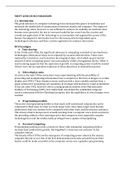
Introduction to HCI Paradigms
HCI Paradigms 1. Time sharing In the 1940s and 1950s, the significant advances in computing consisted of new hardware technologies. Mechanical relays were replaced by vacuum electron tubes. Tubes were replaced by transistors, and transistors by integrated chips, all of which meant that the amount of sheer computing power was increasing by orders of magnitude. By the 1960s it was becoming apparent that the explosion of growth in computing power would be wasted if there were not an equ...
- Package deal
- Essay
- • 3 pages •
HCI Paradigms 1. Time sharing In the 1940s and 1950s, the significant advances in computing consisted of new hardware technologies. Mechanical relays were replaced by vacuum electron tubes. Tubes were replaced by transistors, and transistors by integrated chips, all of which meant that the amount of sheer computing power was increasing by orders of magnitude. By the 1960s it was becoming apparent that the explosion of growth in computing power would be wasted if there were not an equ...

IV LINES
This file contains all you need to revise for IV LINES; Fluids, nutrients, electrolyte and medication infusion Obtaining venous blood sample Insertion of catheters into the central circulatory system. Thanks for your purchase
- Essay
- • 28 pages •
This file contains all you need to revise for IV LINES; Fluids, nutrients, electrolyte and medication infusion Obtaining venous blood sample Insertion of catheters into the central circulatory system. Thanks for your purchase
